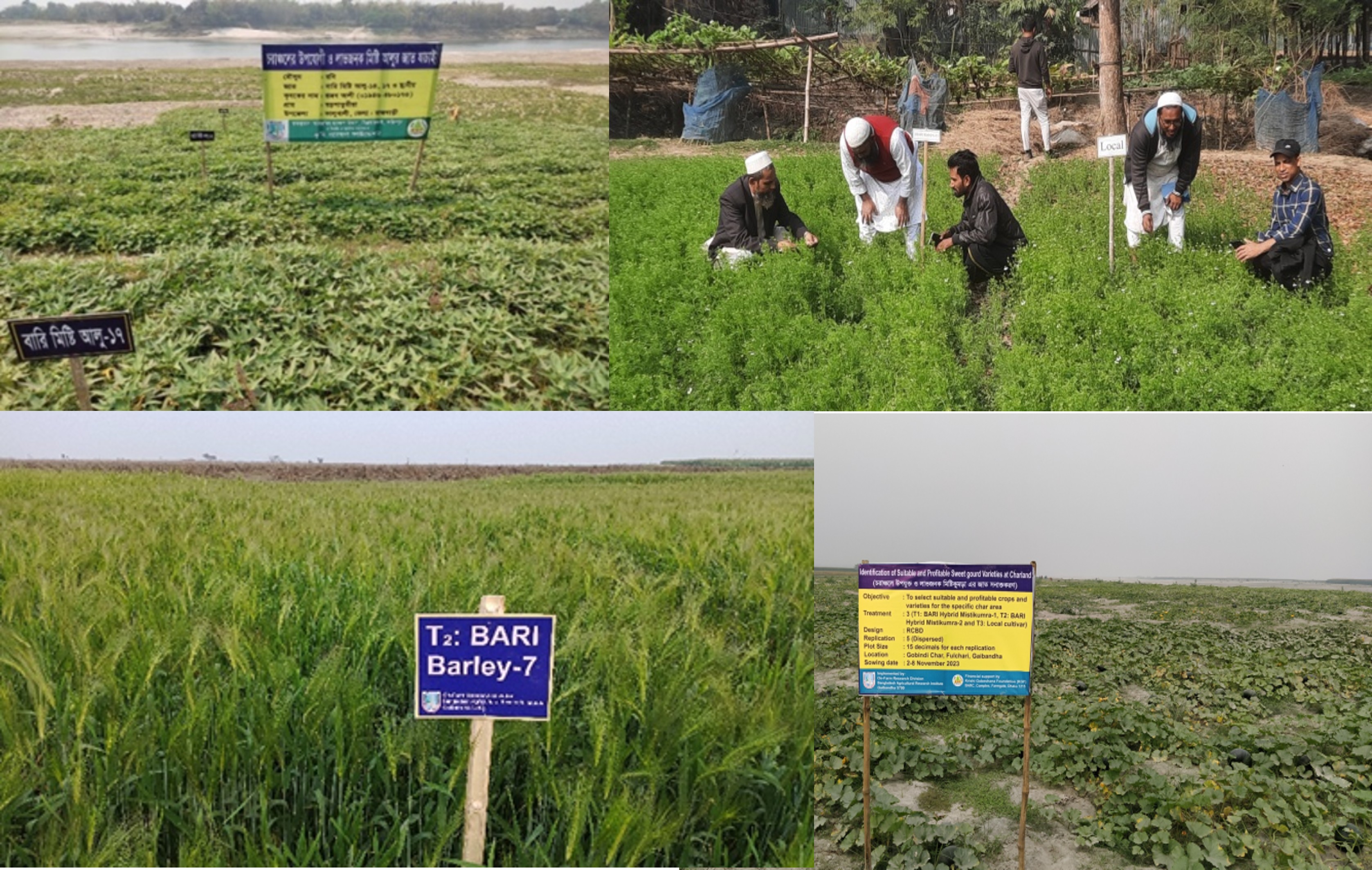Enhancement of Crop Productivity in the Char lands Through Climate Resilient Farming
Char is characterized by a unique social and hydro-environmental situation. The char regions of the Brahmaputra, Jamuna, and Padma basins each provide slightly different prospects for agriculture. The regions encompassing the Brahmaputra, Jamuna, and Padma rivers exhibit a notable lack of crop diversity, primarily characterized by the prevalence of traditional varieties. This limited diversity, along with an unplanned production system, contributes to poor levels of crop output in these areas. In addition, farmers have lack of knowledge regarding the production and preservation of seed, leading to a prevalent issue of seed adulteration when purchasing seeds from the nearest local market. Within this framework, the project centers its attention on the objective of enhancing crop productivity in char lands. This is achieved through a three-fold approach: firstly, by identifying appropriate and economically viable crops and varieties that are well-suited to specific char areas; secondly, by promoting the adoption of high-yielding and profitable crop varieties that are suitable for cultivation in char lands; and thirdly, by establishing a robust seed production system that ensures the availability of quality seeds to farmers through a range of diverse activities.
The research work was initiated at Fulchari Char of Gaibandha; Char Raypur of Bogura; Paturia char and Naduar char of Rajbari; Char Basalia of Tangail; Char Thetrai of Kurigram; Char Komorpur of Pabna and Char belgachha & Naovangar char of Jamalpur District during 2023 to select suitable and profitable crops and varieties for the specific char area. Five suitable and profitable crops and three improved varieties of each crop were selected for the trial at each project location. In Gaibandha, barley, lentil, groundnut, pumpkin and onion crop were selected for the trial. In Rangpur, pumpkin, onion, grass pea, potato and mustard were selected for the trial. In Faridpur, grass pea, Chilli, mustard, sweet gourd, groundnut and onion were selected for the experiment. In Pabna, mustard, lentil, black cumin was chosen for the trial. In Tangail, groundnut, grass pea, wheat and barley were selected for the trial. In Bogura, sweet potato, lentil, onion, groundnut and sweet gourd were selected for the trial. In Jamalpur, Blackgram, mustard, onion, groundnut and sweet gourd were selected for the trial. A total of 13 different crops including pulse, oil seed, vegetables, tuber crops, spices and minor cereals were selected for this project. Suitable high yielding BARI developed varieties of different crop were included in the trial. Among the selected crops groundnut, pumpkin and onion was common for 5 project locations while mustard, grass pea and lentil was common for 3-4 project locations. Five (5) farmers were selected for each crop in the working area and each farmer was treated as one replication. About seventy-five (75) decimal areas were cultivated under each crop including three varieties under this research work. The seeds of lentil, groundnut, pumpkin, onion, grass pea, mustard, barley, potato, wheat, black gram and black cumin were sown on October 30 to November 15, October 22 to November 21, November 2-21, November 5-27, November 9-21, November 8-23, November 6-21, November 29, November 6-21, September 10-18 and November 9-11 respectively across the locations. Different project related activities such as farmers and land selection, crop selection, input (seeds, fertilizer, pesticides) collection was done based on discussion with farmers and frequent visit of OFRD and RARS Team at the selected char locations. Seeds of BARI varieties of different crops were collected from BADC and respective crop centres of BARI. Seeds of local varieties were collected from progressive farmers and local seed dealers. All cooperator farmers of each project location were oriented with the project activities by the respective OFRD and RARS, BARI Team.
BARI Sarisha-17, BARI Masur-8 and BARI Kalozira-1 were found more productive and profitable. OFRD, BARI, Rangpur: BARI Sarisha-17, BARI Piaz-4, BARI Alu-75 and BARI Hybrid Mistikumra-2 were found more productive and profitable. OFRD, BARI, Gaibandha: BARI Barley-7, BARI Chinabadam-9, BARI Masur-8, BARI Hybrid Mistikumra-2 and BARI Piaz-4 were found more productive and profitable. OFRD, BARI, Tangail: BARI Barley-7, BARI Chinabadam-9, BARI Khesari-3 and BARI Gom-32 were found more productive and profitable. OFRD, BARI, Bogura BARI Chinabadam-8, BARI Masur-8, BARI Mistialu-12, BARI Piaz-4 and commercial sweet gourd variety Bankok-1 were found more productive and profitable. OFRD, BARI, Faridpur BARI Khesari-5, BARI Mistialu-17, Binachinabadam-10, BARI Sarisha-19 and BARI Piaz-4 were found more productive and profitable. RARS, BARI, Jamalpur BARI Mash-3, BARI Chinabadam-9, BARI Piaz-4, BARI Mistialu-12 and BARI Sarisha-20 were found more productive and profitable. Presently all trails are at field.
The experiment carried out at different char locations indicated that the productivity of improved varieties of pulse, oilseed, spices, vegetables and minor cereal crops performed better regarding productivity and economic return as compared to locally adapted cultivars/varieties. The productivity of pulse, oilseed, spices, vegetables and minor cereal crops increased by 5 to 64%, 20 to 74%, 10 to 51%, 26 to 89% and 59 to 77% over locally cultivated varieties due to inclusion of improved varieties irrespective of char areas. Regarding the economic benefit, higher gross return and gross margin was obtained from the improved varieties of pulse, oilseed, spices, vegetables and minor cereals due to higher yield. Farmers were happy and expressed their satisfaction with improved varieties across the char locations under this project.
The capacity build up of the farmers has been improved on new varieties and production technologies through formal and informal training program, FGD and networking. In addition, visiting, monitoring and sharing of modern technologies with farmers on different crops resulted in higher productivity and economic return of the farm families in different project locations. Farmers preserved seeds of the latest varieties of different crops and farmers to farmers seed exchange is opening greater scope for seed business and varietal adoption.
Quality seeds are one of the main driving factors for sustainable crop production in char lands. With this project support a quality seed supply chain will be developed through the integration of producer, entrepreneur, Research and DAE. OFRD Team is working on the Development of Village Seed Bank approach for the sustainability of quality seed supply and eventually sustainable crop production in the project locations.

